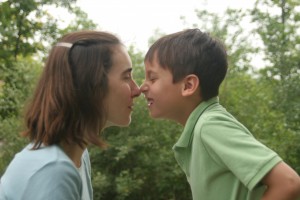
Resources
Make sure that your child’s car seat is installed correctly. You can make the seat a little more comfortable by adding a layer of quilt batting underneath the seat cover.
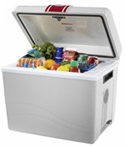 Food allergies are common for children with special needs. Here are some food packing tips.
Food allergies are common for children with special needs. Here are some food packing tips.
If you’re bringing a wheelchair or crutches, consider what type of terrain you will be covering. For example, it is possible to push some types of wheelchairs on hiking trails. Last year Sue Mayer and her family pushed her son to the top of a mountain in the Great Smoky Mountains National Park and then onto a beach by the ocean.
When I asked about planning a special needs road trip in my online social networks, Leonaura responded, “Writing a social story about the trip is essential to help a child really understand the details of what the trip will involve. Special needs children often hate uncertainty and that uncertainty often creates overwhelm and behavior problems.”
 When I was a kid, my 7 siblings and I had assigned seats in our full-size van. Only my parents were permitted to sit in the front. My carsick brother sat next to the door in the second row with the babies, my sisters took care of me in the third row, while my sleepy brothers shared the back bench row. I don’t think anyone ever challenged that sense of order.
When I was a kid, my 7 siblings and I had assigned seats in our full-size van. Only my parents were permitted to sit in the front. My carsick brother sat next to the door in the second row with the babies, my sisters took care of me in the third row, while my sleepy brothers shared the back bench row. I don’t think anyone ever challenged that sense of order.
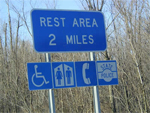 Kids with low muscle tone have to use the bathroom more frequently than most other kids. They may also be more likely to suffer carsickness. Be prepared!
Kids with low muscle tone have to use the bathroom more frequently than most other kids. They may also be more likely to suffer carsickness. Be prepared!
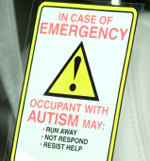 If your child is a wanderer, consider purchasing a child tracking device before you travel. In case your child becomes lost, it is helpful to have a recent photo and a written description of your child’s special needs (Will she respond to her name? Will he run away from strangers?).
If your child is a wanderer, consider purchasing a child tracking device before you travel. In case your child becomes lost, it is helpful to have a recent photo and a written description of your child’s special needs (Will she respond to her name? Will he run away from strangers?).
 If you’re not sure that you or your child can tolerate a 750 mile road trip, try a more manageable trip first. My family visited small cities within 3 hours of our home before we attempted cross-country trips. This allowed my older son to learn what to expect while traveling, and gave him something to look forward to when we planned more trips.
Some of my older son’s most significant milestones, such as self-feeding and toilet-learning, occurred on road trips; I don’t think those were coincidences, because they happened so suddenly and so often while traveling. On the other hand, my younger son does not tolerate long road trips very well, so we’ve had to cut back on travel until he is ready.
If you’re not sure that you or your child can tolerate a 750 mile road trip, try a more manageable trip first. My family visited small cities within 3 hours of our home before we attempted cross-country trips. This allowed my older son to learn what to expect while traveling, and gave him something to look forward to when we planned more trips.
Some of my older son’s most significant milestones, such as self-feeding and toilet-learning, occurred on road trips; I don’t think those were coincidences, because they happened so suddenly and so often while traveling. On the other hand, my younger son does not tolerate long road trips very well, so we’ve had to cut back on travel until he is ready.
 My younger son becomes easily overstimulated, which leads to crying in the car. He needs to have as little sensory input as possible on road trips - no music, conversation or toys except his teddy bear. My older son becomes under-stimulated, which leads to stimming and giggling for hours on end. He likes it when I sing to him in the car, he loves having books and toys and movies, and he’s thrilled to read road signs and visit new places.
To prevent sensory meltdowns, we carry a portable sensory toolkit with favorite items from home and a few new items.
My younger son becomes easily overstimulated, which leads to crying in the car. He needs to have as little sensory input as possible on road trips - no music, conversation or toys except his teddy bear. My older son becomes under-stimulated, which leads to stimming and giggling for hours on end. He likes it when I sing to him in the car, he loves having books and toys and movies, and he’s thrilled to read road signs and visit new places.
To prevent sensory meltdowns, we carry a portable sensory toolkit with favorite items from home and a few new items.
70+ Tips and Tricks for Special Needs Road Trips
It’s road trip season. If you have a child with special needs, as I do, then you know it will take extra planning -- and you have no idea if your best-laid plans will be successful until you actually go. Travel always involves some risks for a child with medical needs or sensory issues. But there are also significant benefits for traveling by car, such as:- Being able to bring medical equipment or comforting items from home
- Freedom to make as many stops as necessary and to customize your itinerary
- Being up close and personal with your family for long periods of bonding
- Changing your daily routine and exploring new environments to learn life skills
- Developing emotional regulation
- Stimulating speech and language development with constantly changing scenery
Car Safety
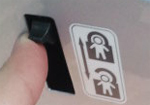 1. Your Child's Car Seat
1. Your Child's Car Seat
Make sure that your child’s car seat is installed correctly. You can make the seat a little more comfortable by adding a layer of quilt batting underneath the seat cover.
2. Child Locks
If your child is an escape artist, consider getting covers for the buckles in the backseat, and remember to switch on the child lock so that the rear doors cannot be opened from the inside.3. Limit Distractions
Driver distraction can create very dangerous situations. Brainstorm ways to reduce your child’s persistent distracting behaviors, such as throwing items from the back seat to the front of the car. I typically sit in the backseat with the kids so that my husband can focus on driving safely.4. Make sure your car is trip ready
Always check the tire pressure and brakes on your car before a long road trip. Most tire stores will provide free air and tire checks. If your car is due for an oil change it would be a good idea to get it taken care of before a long trip.Food for the trip
 Food allergies are common for children with special needs. Here are some food packing tips.
Food allergies are common for children with special needs. Here are some food packing tips.
5. Pack a Cooler
Some families pack a big cooler with all of the food that a child will need during the trip. Refrigerated coolers that plug into a car’s cigarette lighter make it possible to pack all types of food and medicine.6. Stop along the way
Other families locate specialized grocery stores along their route and plan to re-stock special foods during the trip. Stores such as Trader Joe’s and Whole Foods provide addresses and directions to all of their locations on their websites.7. Regulate your body
Most travelers, with and without special needs, eventually complain about constipation. Be sure to pack some dried fruit, plenty of water, high-fiber cookies or milk of magnesia to prevent discomfort.Medical equipment
 8. The right equipment for travel
8. The right equipment for travel
If you’re bringing a wheelchair or crutches, consider what type of terrain you will be covering. For example, it is possible to push some types of wheelchairs on hiking trails. Last year Sue Mayer and her family pushed her son to the top of a mountain in the Great Smoky Mountains National Park and then onto a beach by the ocean.
9. Find out what your hotel will provide
Michell Haase explains in her blog that some hotels can provide certain types of equipment such as shower chairs or hospital beds, but you must call and speak to the hotel manager in most cases. You can also rent equipment locally during your stay. Most major hotel chains offer wheelchair-accessible rooms with accessible bathrooms, but they must be reserved in advance. Families who enjoy camping may buy or rent an extra-large tent for wheelchair accessibility.Preparing your child
 10. Write a Social Story
10. Write a Social Story
When I asked about planning a special needs road trip in my online social networks, Leonaura responded, “Writing a social story about the trip is essential to help a child really understand the details of what the trip will involve. Special needs children often hate uncertainty and that uncertainty often creates overwhelm and behavior problems.”
11. Provide Visuals
My husband and I have also used photo albums, schedules and maps to help our children understand where we are going and whom we will see. Any type of visual support will reduce anxiety and increase interest.Seating Arrangements
 When I was a kid, my 7 siblings and I had assigned seats in our full-size van. Only my parents were permitted to sit in the front. My carsick brother sat next to the door in the second row with the babies, my sisters took care of me in the third row, while my sleepy brothers shared the back bench row. I don’t think anyone ever challenged that sense of order.
When I was a kid, my 7 siblings and I had assigned seats in our full-size van. Only my parents were permitted to sit in the front. My carsick brother sat next to the door in the second row with the babies, my sisters took care of me in the third row, while my sleepy brothers shared the back bench row. I don’t think anyone ever challenged that sense of order.
12. Separate your children
To keep the peace on a road trip, it may be necessary to separate children. My older son is now 5 feet tall and 95 pounds, so he sometimes sits in the front passenger seat, where he likes to select music for our family. Sometimes I sit in the middle of the backseat with one child on either side of me. This prevents backseat battles. If you are driving a larger car with a third row, you can experiment with changing seats after each stop - sometimes the change in perspective is enough to lighten the mood.The “pee can” and frequent stops
 Kids with low muscle tone have to use the bathroom more frequently than most other kids. They may also be more likely to suffer carsickness. Be prepared!
Kids with low muscle tone have to use the bathroom more frequently than most other kids. They may also be more likely to suffer carsickness. Be prepared!
13. Regular Stops
My family stops every 90 minutes to 2 hours on the road. This reduces not only toileting accidents in the car, but also general fussiness from lack of exercise. In the same line of thinking, sometimes it is better to spread a 10 hour road trip over 2 days instead of one long day.14. In Case of Emergency!
My mother used to keep one or two empty coffee cans with lids in the car for emergencies. The “pee can” magically appeared as soon as someone complained, and when it was used, Mom would seal it with the lid and look for the nearest trash can.Paperwork & Protection
15. Get an Access Pass
If your itinerary includes a national park or national recreation area, your disabled child is eligible for a free lifetime Access Pass. At some parks, the Access Pass grants free admission to everyone traveling in the vehicle with the pass holder, but the pass holder must present a photo identification along with the Access Pass.16. Physician's Letter
If your itinerary includes an amusement park, you should visit the Guest Services Office to find out if your disabled child is eligible for a fast pass or special ride privileges. You will need a letter from your child’s physician stating the nature of the disability for these privileges.17. Bracelet for Wanderers
 If your child is a wanderer, consider purchasing a child tracking device before you travel. In case your child becomes lost, it is helpful to have a recent photo and a written description of your child’s special needs (Will she respond to her name? Will he run away from strangers?).
If your child is a wanderer, consider purchasing a child tracking device before you travel. In case your child becomes lost, it is helpful to have a recent photo and a written description of your child’s special needs (Will she respond to her name? Will he run away from strangers?).
18. In case of a real emergency
I personally know several parents who had to rush their children to the emergency room while traveling. For children with chronic medical needs, it’s a good idea to identify hospitals or health centers at your destination where your insurance plan is accepted. You may want to keep a one-page medical history in your bag just in case. Hotels and campground staff can also tell you where the nearest pharmacy is.Know your limits
19. Try a shorter road trip first
 If you’re not sure that you or your child can tolerate a 750 mile road trip, try a more manageable trip first. My family visited small cities within 3 hours of our home before we attempted cross-country trips. This allowed my older son to learn what to expect while traveling, and gave him something to look forward to when we planned more trips.
Some of my older son’s most significant milestones, such as self-feeding and toilet-learning, occurred on road trips; I don’t think those were coincidences, because they happened so suddenly and so often while traveling. On the other hand, my younger son does not tolerate long road trips very well, so we’ve had to cut back on travel until he is ready.
If you’re not sure that you or your child can tolerate a 750 mile road trip, try a more manageable trip first. My family visited small cities within 3 hours of our home before we attempted cross-country trips. This allowed my older son to learn what to expect while traveling, and gave him something to look forward to when we planned more trips.
Some of my older son’s most significant milestones, such as self-feeding and toilet-learning, occurred on road trips; I don’t think those were coincidences, because they happened so suddenly and so often while traveling. On the other hand, my younger son does not tolerate long road trips very well, so we’ve had to cut back on travel until he is ready.
Over-stimulation and under-stimulation
20. Portable Sensory Toolkit My younger son becomes easily overstimulated, which leads to crying in the car. He needs to have as little sensory input as possible on road trips - no music, conversation or toys except his teddy bear. My older son becomes under-stimulated, which leads to stimming and giggling for hours on end. He likes it when I sing to him in the car, he loves having books and toys and movies, and he’s thrilled to read road signs and visit new places.
To prevent sensory meltdowns, we carry a portable sensory toolkit with favorite items from home and a few new items.
My younger son becomes easily overstimulated, which leads to crying in the car. He needs to have as little sensory input as possible on road trips - no music, conversation or toys except his teddy bear. My older son becomes under-stimulated, which leads to stimming and giggling for hours on end. He likes it when I sing to him in the car, he loves having books and toys and movies, and he’s thrilled to read road signs and visit new places.
To prevent sensory meltdowns, we carry a portable sensory toolkit with favorite items from home and a few new items.
What other parents are saying
I reached out to other special needs parents on various social networks and asked them for their special needs road trips tips & tricks. Here eleven parents provide over 50 ideas on how to keep their child(ren) entertained on road trips: From Maggie: “I put a metal cookie tray in a pillowcase with all types of magnets. The girls sat in the backseat spelling words and creating scenes and stories for hours.” Maria: “Besides lots of stops, she liked music and snacks - we always stayed at a hotel with a pool. There were days she just made it through so she could get to swim.” Patti: “Counting, I spy, video or iPod, books, studying maps, remembering past adventures and what we loved, talking about what we'll do, snacks. Going in for takeout instead of drive-thru to get energy burnt. Blankets, pillow pets, games, workbooks. Our G wakes up no matter what time of night we travel and becomes hyper-alert, so we're always worn out. Our I Spy games are marathons, so we mix it up and get downright silly. Example: I spy something that my big brother loved when he was young (trains), I spy something with 18 wheels, I spy a truck that I 'd love to drive (Doritos). I spy fingerprints on windows (they all claim theirs), etc. Math is G's thing in the car, so we bring a calculator to save us from answering 3 and 4 digit problems. We start with simple equations. He constantly asks how many seconds until we're there, so the calculator helps to keep him satisfied. We ask favorites, things we love/hate/get embarrassed by, enjoy on a rainy day, etc. We sing familiar songs and change up the words to fit our lives or be ridiculous. Anything to distract and use imagination!” Karen: "We packed a portable bed rail, because our son is such an active sleeper that he was always rolling out of hotel beds. In the car we have a bag of fidget toys, a hand-held vibrating massager and lots of little Hot Wheels. The boys roll the toy cars back and forth on their hands, because it's soothing." Marlowe: “My daughter loves the sensory motion of the car, so it's not that hard for us. However, my energetic one needs to be entertained and long trips are hard on everyone. Color Wonder markers and pads for worry free art - include one of those activity trays that go on their lap. Road trip game book of activities (finding state license plates, cats cradle, road trip songs, etc.). If two parents are driving, try reading a motivating book. Last summer I read Harry Potter to the whole family with voices for each character on our 5 hour road trip. Scout the map for rest areas with picnic tables and pack a lunch. So much better than fast food, and usually lots of green grass to run around on - also not out of your way. Twenty questions - huge favorite.” Ron: “The Microsoft Entertainment Pack works. We have a bag that has my son's favorite sensory items and music equipment catalog. He reaches in and takes something out to entertain him. Headphones are also good to keep with us.” Ernst: “We joined Audible.com and listened to a wide variety of children's literature during car trips between New York and Florida. Some of the books were like radio plays and were fantastic. There were actually times when we arrived at a destination and did not get out of the car immediately because the whole family wanted to finish listening to the book.” Laura S.: “I make sure to have those certain special items to help my daughter feel ‘at home’ (and as she's gotten older, I let her chose them) as well as new things as ‘surprises’ to keep things exciting and fun when she's getting bored. We have also realized over time that our daughter can only take so much time away from home, or her anxiety level starts really increasing to the point where she just wants the trip to end.” Elaine: “Think about learning style: visual, auditory, kinesthetic, etc. When my kids were little, one of them LOVED listening to audio tapes, but another needed to play with toys. With modern day video, it's changed a lot, but the same concept applies: meet them where they are.” Laura B.: “Depends on the child's age and developmental level! Well-liked toys! Favorite videos! Favorite storybooks! Favorite music! Favorite relatively easy to clean up food and drinks!” Robin: “If you are on the road, take frequent breaks! This is a great time to break out new videos, especially comedies to keep the mood happy. Good air conditioning is important. We were stuck in a HUGE traffic jam in LA. We broke out The Honeymooners DVD collection and the kids really enjoyed them. The body language of Ralph Cramden is terrific for spectrum and LD kids to learn about humor and comedy. Marx Brothers movies, as well as Mr. Bean, are terrific. All of my kids have developed a very sharp sense of humor.” I would love to hear your special needs road trip ideas. Please share in the comments below.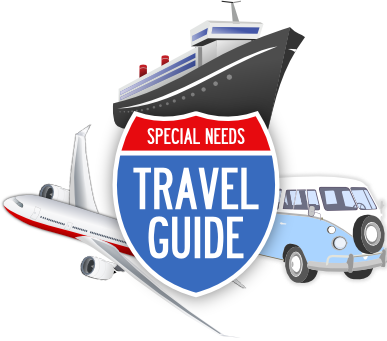 This above post is part of a nine part series on disability travel. Here are the other posts in this series.
This above post is part of a nine part series on disability travel. Here are the other posts in this series.

